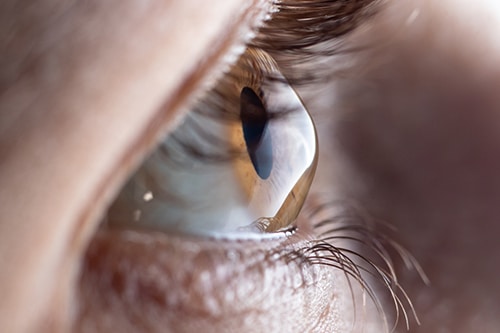Keratoconus
Keratoconus is a progressive condition that causes the cornea to become thin and develop a cone-shaped bulge (the literal meaning of Keratoconus is “cone-shaped cornea”). When the shape of your cornea is altered, your vision becomes distorted.
Symptoms of Keratoconus may include:
- Blurred or distorted vision
- Increased light sensitivity and glare
- Increased nearsightedness or astigmatism
- Eye irritation (usually mild)
- Need to change eyeglass prescriptions frequently
- Inability to wear contact lenses


What Causes Keratoconus?
Approximately 10 percent of people who have Keratoconus also have a family member with the condition, leading researchers to believe that genetics are a factor, but the cause of Keratoconus is not yet known.
Developing Keratoconus has also been associated with eye injury, certain eye diseases, and some systemic diseases.
How Common Is Keratoconus?
Keratoconus is not common. Symptoms usually begin as people reach their late teens or early 20s. The rate of progression varies from person to person. It will often progress slowly for about 10 to 20 years, then stop suddenly.
How Is Keratoconus Treated?
The best treatment option depends on the severity of symptoms. During early stages when symptoms may be less severe, vision can often be corrected with eyeglasses. As the condition worsens, rigid contacts may be needed to minimize distortion. In some cases, small, curved corneal devices called Intacs can be implanted to help flatten the cornea.
When acceptable vision no longer achieved with these methods, a corneal transplant may be necessary, though only about 10 percent to 20 percent of cases require it.
A non-FDA-approved option is collagen cross-linking. This treatment uses a special laser in cnjunction with eyedrops to promote strengthening of the collagen fibers in the cornea. The goal is to flatten and stiffen the cornea to prevent greater protrusion.
Can Keratoconus Cause Any Other Problems?
Because of the effect on your vision, Keratoconus can make many normal everyday activities, like watching TV, driving and reading, more difficult.
